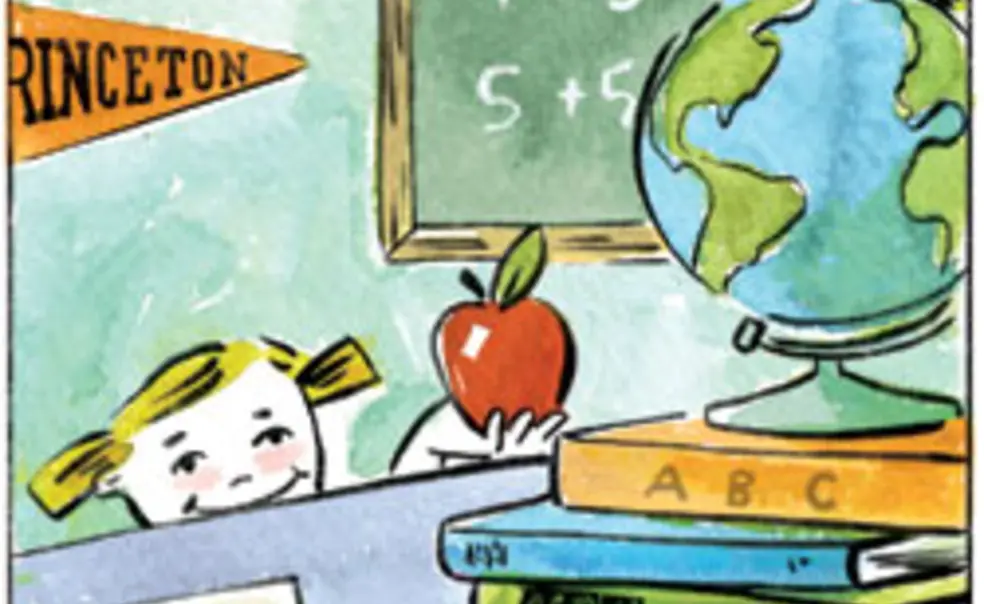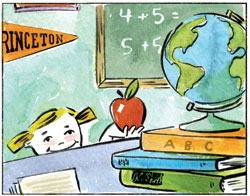Reunions 2010: Using your degree
The following story is included in PAW's 2010 Reunions Guide, available on campus May 27.
By Jennifer Albinson ’05
Illustration by Hadley Hooper |
Jennifer Albinson ’05 teaches first grade at Malcolm X Academy in San Francisco.
It hit me one winter day in my first year out of Princeton. Like so many classmates, I was living in New York. Unlike so many classmates, at that moment, I was in an elementary school cafeteria, scooping pickles onto a 5-year-old's lunch tray and then taking a few back when she squealed "Too many!" As I offered her a spoonful of corn, I said to myself, "Seriously, is this how I'm using my Princeton degree?" And, with no one but the 5-year-old to respond to my question, I spoke up again. "I think the answer is apparently 'yes.' "
The "apparently yes" moments have been plentiful, especially as an elementary school teacher. They have ranged from the poignant (despairing that my training in Latin American history hadn't prepared me to handle a situation with a student and her potentially abusive mother) to the disgusting (mopping a child's regurgitated lunch off my classroom floor). Sometimes the Princeton banner on my classroom wall just fades into the background, indistinguishable from the artwork and colorful charts that surround it. Other times, it's like a bright orange billboard, announcing to me and anyone else who will listen that "only people who've actually used their degree deserve to go to Reunions."
On the occasion of my eighth journey to the fifth reunion tent -- and my first major reunion -- I decided to explore how I conceived of my Princeton training and what reality emerged.
Conception: If I take John McPhee ’53's seminar class in creative nonfiction, I'll be joining the staff of The New Yorker within nanoseconds of graduating. Reality: The closest I come to creative nonfiction is writing homework packets. Take-away: First graders appreciate quality writ- ing, too; The New Yorker might do well to consider them potential subscribers.
Conception: My thesis adviser and I will have a long and fruitful relationship, in which she continues to offer insights into my scholarly work, and I, in turn, make her proud by publishing book after book. Reality: We're still in close touch, but she's turned out to be much more useful in procuring cast-off children's books from her local library, as well as spotting 50-percent-off sales on Play-Doh. Every few weeks, she sends me a new package of goodies. Take-away: Thesis advisers advise more than theses.
Conception: Leading an Outdoor Action trip was a really fun way to kick off each year of college, but when I graduate, it will be time to put away the compass and camp stove. Reality: While some of the skills I learned haven't come in handy (to my surprise, I've not yet needed to splint a broken femur), the supposed soft skills of group dynamics, "leader radar" (imagine Rick Curtis ’79 pivoting his open palm over his head as you say those words), and conducting an effective debrief have become the essential hard skills of my career. Take-away: You may think you're just chatting while you wait for the murky creek water to iodize, but you're really reÌsumeÌ-building.
Conception: My Princeton friends were amazing companions in precepts and on The Street, but now that we're all moving to disparate corners of the globe, we'll likely fall out of touch. Reality: Whenever I've felt my Princeton education had wildly unprepared me for the trials of adult life, it was my friends from that very same institution who supported me through the challenge at hand. Sometimes that support was coming from places like a refugee camp on the Burmese border, but it nonetheless came immediately and unconditionally. Take-away: All those long study breaks at the Bent Spoon were worth it.
As an undergraduate, if I had to pinpoint the experiences -- the courses, the relationships, the extracurricular activities -- that would prove meaningful to my young adult life, I probably could have identified them easily. However, I could not have explained accurately why these experiences would be relevant. I went through Princeton thinking I was learning one thing and enriching myself in one way, but then I graduated and realized that I'd actually been learning an infinite list of other skills that would be fundamental to my success as an adult.
 |
Jennifer Albinson ’05 |
And so, next fall, as I shake the dust off my Princeton banner, I'll coolly inform it to stop giving me pangs of insecurity. I am using my degree, and perhaps, I'm using it exactly as Princeton intended me to: in a way that is so integral to the fabric of my life as to be rendered almost invisible.













No responses yet